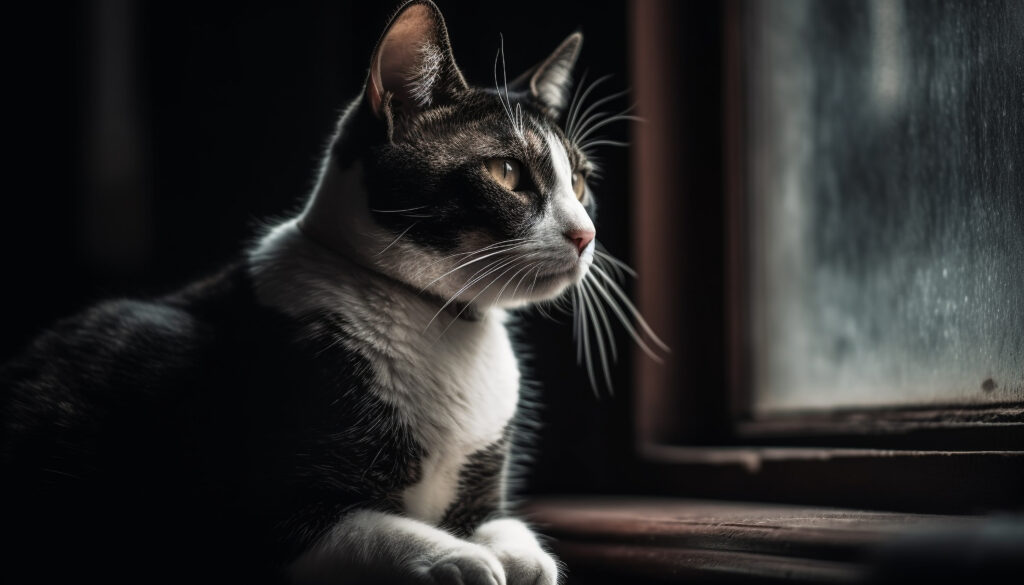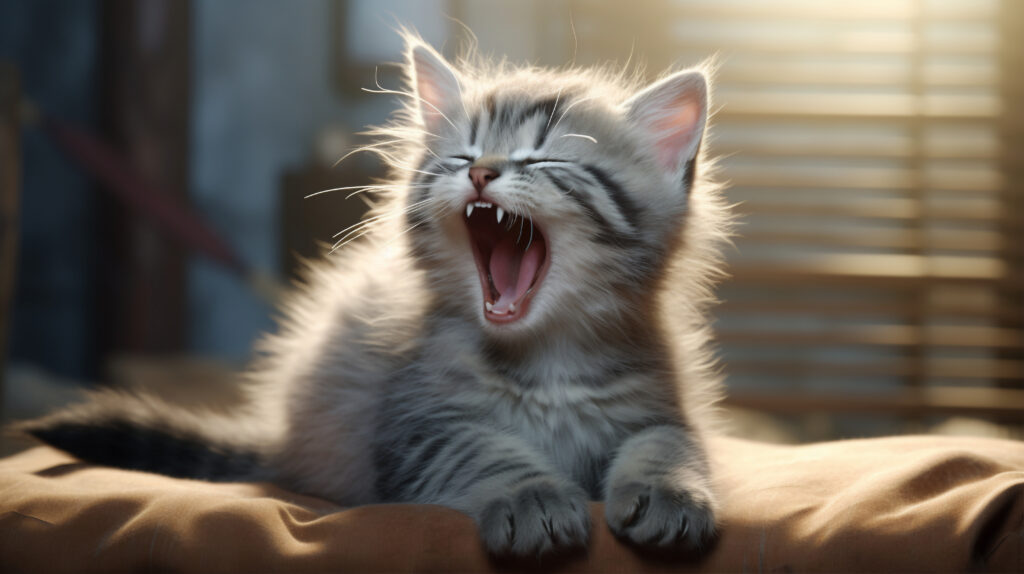Anxious Cat when you see your pet scared and shaking, your instinct as a pet parent is to soothe and calm them. But when your hugs and cuddles aren’t doing the trick, what’s the next best solution? And how do you know what is the source of the stress and anxiety Anxious Cat , so you can help prevent it in the future? That’s where this calming guide comes in handy.

Outline
- Introduction
- Understanding Feline Anxiety
- Why It’s Important to Address Cat Anxiety
- Recognizing Anxiety in Cats
- Common Signs of Anxiety
- Behavioral Changes to Watch For
- Common Causes of Anxiety in Cats
- Environmental Changes
- Social Factors
- Health Issues
- Preventive Measures
- Creating a Safe Space
- Regular Routines
- Gradual Introductions to New Things
- Home Remedies for Anxious Cats
- Herbal Solutions
- Calming Scents
- Music Therapy
- Diet and Supplements
- Foods That Help with Anxiety
- Essential Supplements
- Behavioral Training Techniques
- Positive Reinforcement
- Clicker Training
- Desensitization
- Environmental Enrichment
- Toys and Puzzles
- Scratching Posts
- Climbing Trees
- The Power of Play
- Interactive Playtime
- Solo Play Options
- Human Interaction
- Gentle Handling
- Building Trust
- Understanding Body Language
- Professional Help
- When to See a Veterinarian
- Veterinary Behaviorists
- Medication Options
- Alternative Therapies
- Acupuncture
- Massage Therapy
- Reiki
- Traveling with an Anxious Cat
- Preparing for Travel
- During the Journey
- Post-Travel Care
- Long-term Management Strategies
- Monitoring Progress
- Adjusting Techniques
- Consistency is Key
- Conclusion
- Recap of Key Points
- Encouragement for Cat Owners
- FAQs
- How can I tell if my cat is anxious?
- Are there specific breeds more prone to anxiety?
- Can an anxious cat become calm over time?
- Is medication the only solution for severe anxiety?
- What are some signs that my efforts are working?
The Ultimate Guide to Calming Your Anxious Cat
Introduction
Having an anxious cat can be stressful for both you and your feline friend. Understanding feline anxiety and knowing how to address it is crucial for maintaining a happy and healthy home environment. So, let’s dive into everything you need to know about calming your anxious cat.
Recognizing Anxiety in Cats
Common Signs of Anxiety
Cats, just like humans, can suffer from anxiety. Recognizing the signs is the first step in helping your kitty. Look out for excessive grooming, hiding, aggression, or changes in eating and litter box habits.
Behavioral Changes to Watch For
Is your normally playful cat suddenly withdrawn? Maybe they’re scratching furniture more than usual or meowing incessantly. These behavioral changes are red flags that something is amiss.
Common Causes of Anxiety in Cats
Environmental Changes
Cats are creatures of habit. Any disruption to their environment, like moving house or rearranging furniture, can trigger anxiety.
Social Factors
Introducing a new pet or even a new family member can stress your cat. They might feel threatened or unsure about their place in the household.
Health Issues
Sometimes, anxiety stems from underlying health problems. Dental pain, urinary tract issues, or even thyroid problems can make your cat uneasy.
Preventive Measures
Creating a Safe Space
Ensure your cat has a quiet, comfortable place to retreat to when they feel overwhelmed. A cozy bed in a secluded corner can work wonders.
Regular Routines
Cats thrive on routine. Feeding, playing, and bedtime should occur at the same times each day to create a sense of security.
Gradual Introductions to New Things
When introducing anything new, whether it’s a toy or a pet, do it gradually. Let your cat sniff and explore at their own pace.
Home Remedies for Anxious Cats
Herbal Solutions
Certain herbs like valerian root and catnip can have calming effects on cats. Always consult your vet before trying herbal remedies.
Calming Scents
Diffusing calming scents like lavender or chamomile can create a serene environment for your cat.
Music Therapy
Soft, classical music can soothe anxious nerves. There are even playlists designed specifically for cats.
Diet and Supplements
Foods That Help with Anxiety
Some cat foods are formulated with ingredients that promote relaxation. Look for foods containing L-theanine or tryptophan.
Essential Supplements
Omega-3 fatty acids, probiotics, and certain vitamins can help reduce anxiety. Again, consult your vet before adding supplements to your cat’s diet.

Behavioral Training Techniques
Positive Reinforcement
Reward calm behavior with treats or affection. This positive reinforcement can help your cat associate calmness with positive outcomes.
Clicker Training
Clicker training isn’t just for dogs. It can help reinforce positive behaviors in cats, too.
Desensitization
Gradually exposing your cat to anxiety triggers in a controlled way can help them become less sensitive over time.
Environmental Enrichment
Toys and Puzzles
Interactive toys and puzzles can keep your cat’s mind occupied and reduce anxiety.
Scratching Posts
Provide plenty of scratching posts. Scratching is a natural way for cats to relieve stress.
Climbing Trees
Cat trees and shelves offer your cat a place to climb and observe their environment from a safe height.
The Power of Play
Interactive Playtime
Spend time each day playing with your cat. Use toys that mimic prey to engage their hunting instincts.
Solo Play Options
When you’re not around, make sure your cat has toys they can play with on their own.
Human Interaction
Gentle Handling
Handle your cat gently and respect their boundaries. Avoid forcing interaction if they seem stressed.
Building Trust
Spend quality time with your cat, offering treats and gentle petting to build trust.
Understanding Body Language
Learn to read your cat’s body language. Signs like flattened ears or a twitching tail can indicate stress.
Professional Help
When to See a Veterinarian
If your cat’s anxiety is severe or persistent, it’s time to see a vet. They can rule out medical issues and suggest treatment options.
Veterinary Behaviorists
In some cases, a veterinary behaviorist can help develop a comprehensive treatment plan.
Medication Options
Sometimes, medication is necessary to manage severe anxiety. Always use medications prescribed by your vet.
Alternative Therapies
Acupuncture
Acupuncture can be beneficial for some cats. It’s a natural way to alleviate anxiety and improve overall well-being.
Massage Therapy
Gentle massage can relax your cat and strengthen your bond.
Reiki
Reiki is a form of energy healing that can help calm anxious pets.
Traveling with an Anxious Cat
Preparing for Travel
Get your cat used to their carrier well before the trip. Make it a comfortable and inviting space.
During the Journey
Keep the carrier secure and cover it with a blanket to reduce visual stressors. Talk to your cat in a soothing voice.
Post-Travel Care
After the journey, give your cat time to adjust to the new environment. Provide familiar items like their bed or toys.
Long-term Management Strategies
Monitoring Progress
Keep a journal of your cat’s behavior to track what works and what doesn’t.
Adjusting Techniques
Be flexible and willing to try different strategies. What works for one cat might not work for another.
Consistency is Key
Consistency is crucial. Stick to routines and continue using successful calming techniques.
Conclusion
Addressing your cat’s anxiety is a journey that requires patience and persistence. By understanding their needs and employing various strategies, you can help your feline friend live a happier, calmer life.
FAQs
How can I tell if my cat is anxious?
Look for signs like excessive grooming, hiding, aggression, or changes in eating and litter box habits.
Are there specific breeds more prone to anxiety?
While any cat can experience anxiety, some breeds, like Siamese and Burmese, are more prone due to their sensitive nature.
Can an anxious cat become calm over time?
Yes, with consistent effort and the right techniques, an anxious cat can become more relaxed over time.
Is medication the only solution for severe anxiety?
No, medication is one option. Behavioral training, environmental changes, and alternative therapies can also be effective.

What are some signs that my efforts are working?
Reduced signs of stress, more regular eating habits, and increased social interaction are good indicators that your efforts are paying off.








